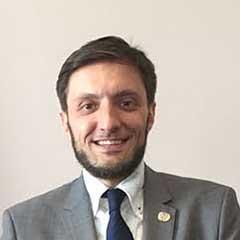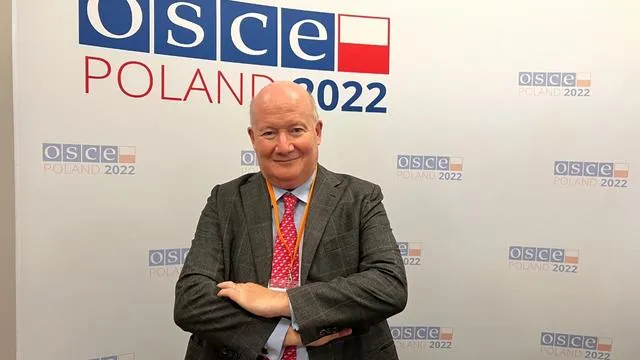
After two years of online activities due to COVID-related problems, finally OSCE, the Organization for Security and Cooperation in Europe, was able to organize again a in-person yearly Human Dimension Meeting in Warsaw held from September 26 to October 7. One of the issues discussed was the anti-cult activities by FECRIS and its Russian's accomplices.
FECRIS, Russian Anti-Cultism Denounced at the OSCE
by Alessandro Amicarelli — Russian Anti-Cultism Denounced at the OSCE: Massimo Introvigne at the OSCE Human Dimension Conference in Warsaw.

Massimo Introvigne at the OSCE Human Dimension Conference in Warsaw
After two years of COVID-related problems, OSCE, the Organization for Security and Cooperation in Europe, organized again a well-attended in-person version of its yearly Human Dimension Meeting in Warsaw. The event runs from September 26 to October 7.
Several speakers noted that the situation of freedom of religion or belief is deteriorating, both on a worldwide scale and in the OSCE area, where Russia’s war of aggression against Ukraine was accompanied both by a crackdown on religious minorities in Russia and by violations of religious liberty in the occupied areas of Ukraine.
Some of the speeches, including those by Italian sociologist and editor-in-chief of Bitter Winter Massimo Introvigne, by Willy Fautré, co-founder and director of the Belgian NGO Human Rights Without Frontiers, and by Christine Mirre, deputy director of the United Nations ECOSOC-accredited NGO CAP-Freedom of Conscience (CAP-LC), addressed the situation of religious minorities labeled and demonized as “cults,” and the activities of FECRIS, the European Federation of Centres of Research and Information on Cults and Sects, an umbrella organization largely supported by French taxpayers’ money.
On September 28, CAP-LC also organized a well-attended side event on “Anti-Cult Ideology and FECRIS: Dangers for Religious Freedom,” chaired by Mirre, and where Fautré and Introvigne also spoke, together with Olga Sibireva, from the authoritative Russian NGO SOVA Center for Information and Analysis.
The same themes, with a special focus on campaigns against the Church of Scientology, had been discussed on September 22 at the University of Padova, at a scholarly conference on “Religion Between Governance and Freedoms.” In a session chaired by James T. Richardson, one of the best-known American sociologists of religions, Introvigne discussed the use of “cult” in the United States both as a tool of discrimination and slander against Scientology and in controversies about QAnon and Donald Trump. Rosita Šorytė, deputy editor of Bitter Winter, presented the use of “cult” and “extremist organization” in Russia as labels used to designate the Jehovah’s Witnesses and Scientology and to claim that “American” religious movements created anti-Russian feelings and policies in Ukraine, thus making the invasions of 2014 and 2022 somewhat “necessary.” A paper by Bernadette Rigal-Cellard from University of Bordeaux Montaigne (em.) on the problems of studying Scientology in an objective way in France was also read.
In Warsaw, Introvigne noted that “cult” is an English word that should be translated in French as “secte,” and in other languages with the corresponding derivatives of the Latin word “secta.” The early sociologists of religion used these words with a neutral meaning. They indicated the newly founded religious groups to which the majority of members had converted rather than being born there. However, around World War II, scholars of a new science, criminology, started using “cult” or “secte” with a different meaning. A “cult” for them was a religious group that committed or would likely commit serious crimes.
This created a semantic ambiguity, Introvigne explained. For this reason, scholars of religious minorities, starting at least in the 1970s, largely abandoned the use of words such as “cult” or “secte,” and chose the more neutral “new religious movements.” They did not imply that all new religious movements respected the law. They recognized that there were “criminal religious movements” both within the older and the newer religious traditions.
However, Introvigne explained, criminal religious movements commit common crimes such as homicides, sexual abuse, or terrorism. However in the late 1960s an “anti-cult movement” was born, which accused many new religious movements of committing a new crime, using “brainwashing” or “mental manipulation” to convert, control, and harm their followers. “Brainwashing” was a term invented by the American intelligence to designate techniques allegedly used in the Soviet Union and China to convert citizens to communism. It was later applied to religious conversion. However, the vast majority of scholars of religion, and courts of law in the United States and elsewhere, came to the conclusion that brainwashing was an imaginary crime. There is no brainwashing, and processes of conversion to the so-called “cults” are not different from those in traditional religions.
As Willy Fautré explained, the anti-cult movement became an international lobby which in Europe operates mostly through FECRIS. The anti-cult ideology was also officially adopted in Russia to justify the repression of religious minorities the regime did not like, and the Russian Orthodox Church regarded as competitors. More recently, Russian anti-cultists have used the “cult” rhetoric to justify the aggression against Ukraine, claiming that “cults” dominate Ukrainian politics and are used by the Ukrainian intelligence to infiltrate Russia. Russian and Western anti-cultists share the same ideology and use the words “cult” and “extremist organization” as a tool of discrimination and repression, as Sibireva illustrated through various examples of religious groups “liquidated,” including the Jehovah’s Witnesses, or declared “undesirable” in Russia.
France officially answered at the OSCE that it will continue to support FECRIS, without addressing the merit of the criticism, and FECRIS posted on its website a statement, complaining that “some people or groups are currently using the Russian-Ukrainian conflict as a pretext to falsely label FECRIS as pro-Russian.”
This is an egregious example of a straw man strategy. Nobody has accused FECRIS of supporting Russia in the current conflict. What we accuse FECRIS of, is to have had among its members for decades Russian affiliates that, since 2004 and particularly since 2014, have supported Russia’s aggressive policy against Ukraine and contributed to Russian propaganda by falsely claiming that the Ukrainian democratic movement is controlled by “cults.”
In 2022, the organization’s Russian affiliates, including FECRIS board member and its Vice President from 2009 to 2021, Alexander Dvorkin, emerged as staunch supporters of the invasion. We have always reported that FECRIS condemned the invasion, but also that it did nothing about its pro-Putin Russian members until the first days of April 2022, when without public announcements or press releases the names of the Russian affiliate organizations disappeared from FECRIS’ website. Dvorkin, according to publicly available documents, remained a board member. We heard rumors that the situation might have been changed but a mail sent on September 3 by CESNUR to FECRIS asking for clarification remained unanswered.
According to reports published by Chinese official sources, as late as July 15, 2022, FECRIS’ treasurer Didier Pachoud and his FECRIS affiliate organization GEMPPI hosted in a conference Roman Silantyev, one of the Russian anti-cultists who claim that Ukrainian leaders are inspired by “occult and pagan” ideologies, and infiltrate “Satanists” into Russia for purposes of sabotage and terrorism.
Yes, FECRIS took a stand against the 2022 invasion, but we are entitled to regard this position as merely cosmetic until it will be accompanied by a clear and public repudiation and condemnation of its Russian affiliates, including Alexander Dvorkin, and an admission that the Russian FECRIS supported Russian aggression against Ukraine since 2014, contributed to Putin’s anti-Ukrainian propaganda, and sponsored and organized the repression of religious minorities in Russia.
Article also published on Bitter Winter





